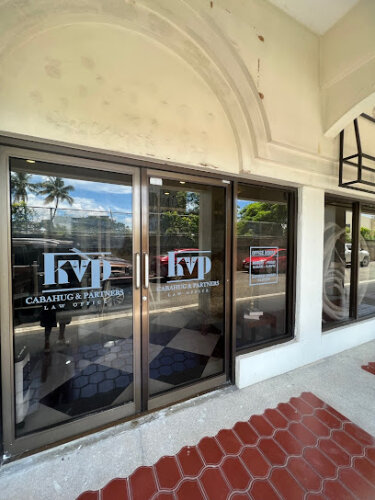Best Real Estate Lawyers in Cebu City
Share your needs with us, get contacted by law firms.
Free. Takes 2 min.
Free Guide to Hiring a Real Estate Lawyer
List of the best lawyers in Cebu City, Philippines
Philippines Real Estate Legal Questions answered by Lawyers
Browse our 27 legal questions about Real Estate in Philippines and read the lawyer answers, or ask your own questions for free.
- landlord tenant
- MY property is being rented and the lease is expiring next year. I have been giving the rent to my parents . now my siblings are disputing the legality of the property being under my name. The property has been under my name with title and deed of sale for... Read more →
-
Lawyer answer by Romano Legal Services
You can give your tenant a Demand Letter for the rental payments and, if ignored, to send him a Notice of Eviction afterwards. Do not argue with your tenant but just send him the formal demand because this will be...
Read full answer - Donor Tax
- Hello , My wife is a Philippines national and I am a UK national . We have been legally married for many years . We live in the Philippines and I wish to send funds to my wifes bank account in the Philippines from my bank abroad for the purpose... Read more →
-
Lawyer answer by Romano Legal Services
No, donor's tax will not be assessed since what will appear is a sale transaction, and the fact that you are the one providing funds for the purchase will not appear in the deed of sale.
Read full answer - land sale unwritten promise not meet, checking for honest and fair options for us
- my elderly aunt's land (no child or spouse) sits in the middle of 2 neighbors land. these 2 neighbors talked my aunt into selling a portion for the back neighour for their driveway, if not the front neighbor will close the roadway. the sale went thru with the agreement to... Read more →
-
Lawyer answer by Recososa Law Firm
Hello: Atty. Jofre here from Recososa Law Firm. Since your matter clearly involves property located in the Philippines, let me walk you through what remedies are legally viable and what strategy usually works in cases like this. You are not...
Read full answer
Philippines Real Estate Legal Articles
Browse our 1 legal article about Real Estate in Philippines written by expert lawyers.
- Buying Property in the Philippines: Foreigner's Legal Guide
- Always verify the title with the Registry of Deeds and check for liens, disputes, and unpaid taxes before paying any substantial amount. Foreigners generally cannot own land in the Philippines but can own condominium units (up to 40% of a project) and enter long-term land leases. Total transaction costs for... Read more →
About Real Estate Law in Cebu City, Philippines
Cebu City, a bustling hub of commerce and tourism in the Philippines, has a dynamic real estate scene that attracts both local and international investors. The real estate market here encompasses a broad range of properties, from residential homes and condos to commercial spaces and vast agricultural lands. Understanding the intricacies of real estate law in Cebu is crucial for anyone involved in buying, selling, leasing, or developing property. The rules and regulations governing real estate in Cebu can be complex, influenced by national laws, local ordinances, and cultural practices. Whether you're acquiring property as an individual or a corporation, savvy navigation of these legal waters is essential for a smooth transaction.
Why You May Need a Lawyer
Engaging a lawyer in real estate matters is often necessary to protect your interests and ensure compliance with the law. Here are some common situations where legal help might be required:
- Purchasing or selling property, where legal due diligence and contract negotiations are key.
- Disputes over property ownership or boundaries.
- Negotiating lease agreements or resolving issues between landlords and tenants.
- Handling estate planning and real estate inheritance issues.
- Complying with local zoning regulations and building codes during development.
- Assistance with the documentation required for transfer of property ownership.
- Navigating the complexities of property financing and mortgages.
Local Laws Overview
The local real estate laws in Cebu City are shaped by a combination of national legislation and local ordinances. Key areas of focus include:
- Land Ownership: The Philippines has strict laws regarding land ownership, particularly for foreigners, with ownership typically restricted to Filipino citizens or corporations with significant Filipino ownership.
- Property Taxation: Real estate transactions are subject to various taxes, including Capital Gains Tax, Documentary Stamp Tax, and local transfer taxes.
- Land Use and Zoning: Cebu City has zoning ordinances that dictate how land can be used, which must be adhered to during any property development.
- Condominium Act: Governs the ownership and development of condominium properties, including foreign ownership rules within certain limits.
- Building Permits: Compliance with building codes and obtaining the necessary permits is mandatory for any construction activity in Cebu City.
Frequently Asked Questions
What are the restrictions on foreign ownership of real estate in Cebu?
Foreigners are generally not allowed to own land in the Philippines, but they can own condominium units within a development where foreign ownership does not exceed 40% of the total units.
How are real estate transactions taxed in Cebu City?
Real estate sales are subject to several taxes including, but not limited to, Capital Gains Tax at 6% of the sales price or zonal value, Documentary Stamp Tax, and local transfer taxes. It's advisable to consult with a lawyer or tax advisor for detailed guidance.
What is the role of a notary public in real estate transactions?
A notary public authenticates legal documents related to real estate transactions, ensuring that all parties understand and voluntarily agree to the contract terms. Notarization is crucial for the validity of documents.
How can I resolve a property boundary dispute?
Boundary disputes typically require a formal survey and, often, the assistance of a lawyer to navigate potential legal filings or negotiations between parties.
What should I consider before signing a lease agreement?
Before signing a lease, you should understand all terms and conditions, including the rent amount, lease duration, maintenance responsibilities, and consequences for breach. Legal counsel is helpful in clarifying terms and ensuring your interests are protected.
Can I change the use of my land from residential to commercial?
Changing land use typically requires approval from local government authorities, including compliance with zoning laws and applications for relevant permits.
What documents are required for a property transfer?
The key documents generally required include the Deed of Sale, transfer certificate of title, tax clearances, and notarized affidavits. Legal assistance is recommended to ensure all needed documents are correctly prepared and submitted.
How do I apply for a building permit in Cebu City?
Application for a building permit involves submitting plans and specifications to the local Building Official, along with other necessary documentation. Compliance with local building codes is essential.
What is an 'extrajudicial settlement' in real estate?
An extrajudicial settlement is a legal process of dividing the estate among heirs without going to court, often used in cases where there are no disputes among heirs regarding the division of property.
Can I dispute a property tax assessment?
If you believe your property has been over-assessed for tax purposes, you can file a dispute with the local Assessor's Office, typically within a set period from the notice of assessment. Consultation with a lawyer specialized in tax law may be beneficial.
Additional Resources
For additional assistance, consider the following resources:
- The Housing and Land Use Regulatory Board (HLURB) oversees regulations related to land use and real estate development in the Philippines.
- The Cebu City Assessor's Office provides information on property valuation and local tax issues.
- The Philippine Bureau of Internal Revenue (BIR) can offer guidance on taxation-related queries.
- Philippine Real Estate boards and associations can provide networking and resources.
- Local real estate agencies and legal firms specializing in property law for personalized consultations.
Next Steps
If you require legal assistance in real estate matters in Cebu City, consider the following steps:
- Identify and list down the specific legal issues or questions you have.
- Seek referrals for reputable real estate lawyers or law firms in Cebu City.
- Schedule consultations to discuss your case and understand the lawyer's approach and fees.
- Gather all relevant documents and information pertaining to your real estate transaction or legal issue.
- Ensure regular communication with your lawyer to keep abreast of developments and necessary actions.
By carefully selecting experienced legal counsel and being proactive in the process, you can navigate the complex real estate landscape of Cebu City effectively.
Lawzana helps you find the best lawyers and law firms in Cebu City through a curated and pre-screened list of qualified legal professionals. Our platform offers rankings and detailed profiles of attorneys and law firms, allowing you to compare based on practice areas, including Real Estate, experience, and client feedback.
Each profile includes a description of the firm's areas of practice, client reviews, team members and partners, year of establishment, spoken languages, office locations, contact information, social media presence, and any published articles or resources. Most firms on our platform speak English and are experienced in both local and international legal matters.
Get a quote from top-rated law firms in Cebu City, Philippines — quickly, securely, and without unnecessary hassle.
Disclaimer:
The information provided on this page is for general informational purposes only and does not constitute legal advice. While we strive to ensure the accuracy and relevance of the content, legal information may change over time, and interpretations of the law can vary. You should always consult with a qualified legal professional for advice specific to your situation.
We disclaim all liability for actions taken or not taken based on the content of this page. If you believe any information is incorrect or outdated, please contact us, and we will review and update it where appropriate.
Browse real estate law firms by service in Cebu City, Philippines
Cebu City, Philippines Attorneys in related practice areas.

















